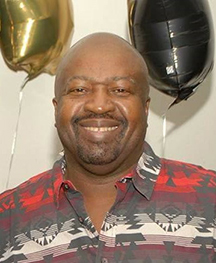Having been terminated as a columnist with the state-owned Guyana Chronicle, political commentator David Hinds today said he feels the newspaper has reverted to the type of behaviour that characterized the Jagdeo years.
“I feel that the Chronicle has slipped right back to where it was during the Jagdeo years—it has again become an unvarnished mouthpiece of the government”, Hinds, an executive member of the Working People’s Alliance said in a statement this evening. Hinds’ fellow columnist Lincoln Lewis has also had his column terminated by the Chronicle. Lewis has also been a frequent critic of the government.
Hinds who has strongly criticised the government in several of his columns in the Chronicle released a letter from the newspaper’s Editor-in-Chief Nigel Williams which stated in part “It is with deep regret, that I inform you that effective March 12, your Sunday column ‘Hind’s Sight’ will be discontinued.
This decision has been arrived at following discussions at the highest level of the company in keeping with policy directions. The Guyana Chronicle as it continues with its rebranding would like to focus on new areas which require specialist interventions at this time.”
A statement by Hinds follows:
Statement by Dr. David Hinds
March 9, 2017
The Editor of the Guyana Chronicle informed me via email that my column in that paper would be discontinued. I am attaching the email. The weekly column was not published over the last two weeks. The editor informed me on the first occasion that it was submitted too late. When it was not carried the following week, I asked the editor for an explanation and he responded with the letter referenced above.
I am not sure whether the decision to continue my column was politically motivated. It is not clear whether the decision was taken in-house, at the level of the Board or within the political corridors. But because I am a political person who comment on political matters, it is not out of place to speculate that the decision was politically motivated. I am aware that sometimes junior agents of the government do bad things because they feel that that is what the government wants them to do.

So, maybe persons in the management feel that my independent stances which are sometimes critical of the government are not fit for a state-owned entity. Or maybe they were given directives from above. I don’t know. Only the editor in chief and his leadership team and can answer that. They should also say whether their decision was sanctioned by the Board. And the Board has to say what role, if any, it played in the decision—Did the editor act based on directives from the Board, political overlords or on his own behalf.
It has always been an uncomfortable relationship, largely because I am not a yes-man; I am independent. Two years ago, the Sunday Editor refused to publish the column that took offence to the president’s summary dismissal of the report and findings of the Walter Rodney Commission of Inquiry (COI). Apparently, the editor felt that I was disrespectful of the president.
I support the government—some would say in an institutional way, I am part of the government—but that support does not muzzle me. I live by the principle that support must not be blind and uncritical. That’s the tradition that I come from—a tradition that is pioneered in modern Guyana by Eusi Kwayana and Walter Rodney. That is what drove my columns which are meant to inspire debate, to educate in a popular way and to ask questions of and oversight power. I take those duties seriously, because I feel that a society without them is a dead society.
I feel that the Chronicle has slipped right back to where it was during the Jagdeo years—it has again become an unvarnished mouthpiece of the government. I feel that my column and Lincoln Lewis’ are critical to holding the line against that trend. A State-owned newspaper is not a government-owned paper—the government manages the paper on behalf of the State. Hence all stakeholders should have equal coverage and be subjected to the same scrutiny. Unfortunately, this is not the case. News-stories on the PPP are often presented with editorial bias. I don’t mind editorials and opinion pieces taking the PPP to task, but news should be free from editorial bias. We fought for these things against the two previous governments.
So, it’s sad to see us going right back to those unhealthy practices. It is as if we have not grown up, we have not learned anything from past mistakes. It amounts to a mockery of democracy and true independence. The PPP did it and we fought against it, so that this government does not do it, encourage it or tolerate it.
In the long run, if the discontinuation of my column is overtly or covertly motivated by political considerations, we are in a bad place—a sad place. I await a statement from the Board, before I make further comments on the matter. In the meantime, I wish to caution that this raises larger questions about freedom of speech, censorship and democracy.
David Hinds









